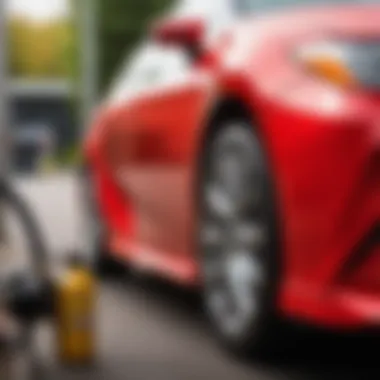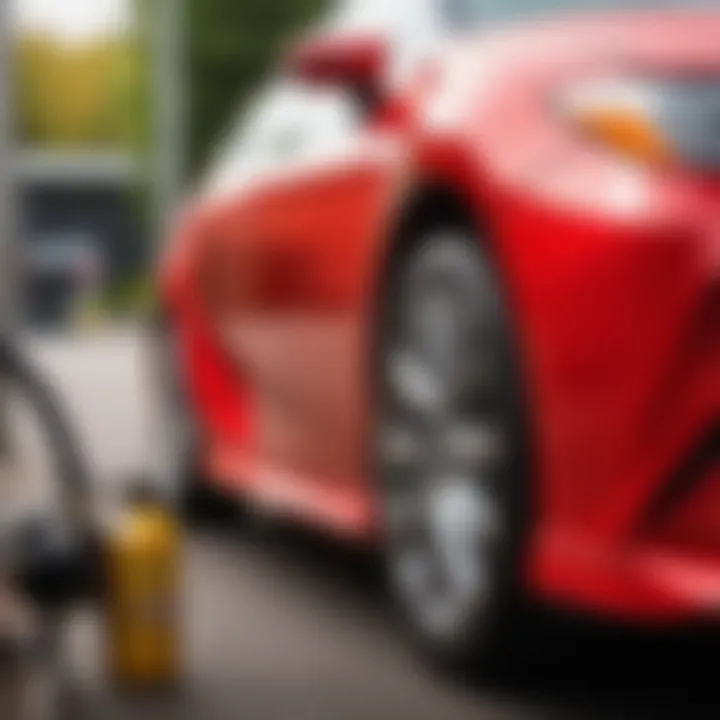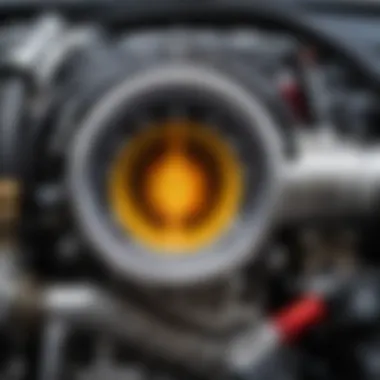Choosing the Best Fuel for Your Toyota Camry 55


Обзор автомобиля
The Toyota Camry 55 stands as a prominent model within Toyota’s lineup, known for its reliability and efficiency. This vehicle offers a balanced combination of comfort, technology, and performance. Understanding its essential characteristics is crucial for any prospective owner or current driver.
Основные характеристики
The Camry 55 is designed with a focus on both urban commuting and long-distance travel. Key features include a spacious interior, advanced safety systems, and fuel-efficient engines. The blend of modern design with functionality makes it an appealing choice for many drivers. With an average fuel economy of approximately 28 miles per gallon, it caters well to those seeking economical options.
Описание двигателей и трансмиссий
The Camry 55 comes equipped with several engine options, notably the 2.5-liter four-cylinder engine and the more robust 3.5-liter V6. Each engine type offers distinct advantages, with the four-cylinder providing excellent fuel efficiency and the V6 delivering significantly more power. The transmission options include an 8-speed automatic that enhances both performance and driveability.
Выбор топлива
Choosing the right fuel for the Camry 55 is integral to maintaining optimal performance and longevity. The owner's manual specifies using unleaded gasoline with a minimum octane rating of 87. However, higher octane fuels can be beneficial for those with V6 models, as it enhances performance under stress.
Important: Using lower quality fuels may lead to engine knocking or reduced performance over time.
Влияние качества топлива на производительность
The quality of fuel used in the Camry 55 can significantly impact engine health. Fuels that contain additives can help clean the engine and maintain its efficiency. Substandard fuels, on the other hand, might leave residues that affect intake valves and combustion chambers adversely.
Выбор автозапчастей
Regular maintenance of the Camry 55 does not just involve fuel. It also requires an understanding of the right auto parts for replacements and enhancements.
Разновидности запчастей
Replacement parts for the Camry 55 can be categorized mainly into OEM (original equipment manufacturer) and aftermarket parts. OEM parts offer guarantees on quality and ensure perfect fitment. Aftermarket parts, while often more affordable, vary in quality and should be considered carefully.
Как выбрать качественные запчасти
When choosing parts, it is essential to research the manufacturer and reviews from other users. Checking for warranties and guarantees can also be an indicator of quality. It is advisable to consult with mechanics or specialized forums to gather informed opinions.
Prelims to the Toyota Camry
Understanding the Toyota Camry 55 involves more than just features and aesthetics. It is vital for owners to realize the significance of fuel selection in optimizing the vehicle's performance and lifespan. Fuel choice impacts not only efficiency but also engine health over time.
Overview of the Camry Model
The Toyota Camry has been a staple in the sedan market for many years. The Camry 55, a later iteration within this long lineage, brings forward advancements in technology, safety, and comfort. It is known for its reliability and fuel efficiency. As such, it is a popular choice among drivers. The camry 55 also features a balanced powertrain, designed to work harmoniously with specific fuel types. Consequently, knowing how to fuel this model correctly can greatly enhance the ownership experience.
Significance of Fuel Choice
Fuel choice plays a crucial role in the operation of any vehicle, and the Camry 55 is no exception. Selecting the right fuel grade can lead to optimal engine performance. Furthermore, the proper fuel not only supports efficient combustion but also helps in maintaining the car’s emissions within regulated limits. This means less environmental impact and better compliance with regulations.
Moreover, choosing an appropriate fuel grade can enhance driving comfort and responsiveness. The engine's design is engineered to perform ideally with certain octane levels. Using lower-grade fuel than recommended may lead to knocking or pinging, which can cause long-term damage to engine components.
"Fuel selection is not merely a preference; it is a critical decision that can influence a vehicle’s reliability and overall durability."
In summary, the introduction of the Toyota Camry 55 contextualizes the significance of fuel choice. It sets the foundation for understanding how this aspect is intricately connected to vehicle performance, longevity, and environmental responsibility.
Understanding Fuel Grades
Understanding fuel grades is crucial for every Toyota Camry 55 owner who wishes to optimize their vehicle's performance and lifespan. Fuel grades refer to the octane ratings of the fuel, which influence how well the engine operates under various conditions. The correct fuel choice can affect not just performance metrics but also fuel efficiency, emissions, and engine durability.


When selecting fuel, several factors come into play, including performance needs, driving style, and environmental concerns. An awareness of the different fuel types and their respective grades helps owners make informed choices that align with their expectations and needs.
Defining Fuel Octane Ratings
Octane ratings are a measure of a fuel's ability to resist knocking during combustion. Knocking occurs when fuel ignites prematurely in the engine cylinder, which can lead to reduced performance or long-term damage if persistent.
The most common octane ratings in the market are 87 (regular), 89 (mid-grade), and 91 or higher (premium). The Toyota Camry 55 generally performs efficiently on regular fuel, but using a higher octane may sometimes enhance performance in certain driving conditions.
Different driving conditions can also demand varying octane levels. For example, driving in mountainous terrain or towing heavy loads may benefit from higher octane fuels. Consequently, it is essential to check the owner's manual for the manufacturer's recommendations regarding octane ratings.
Common Fuel Types for Vehicles
Commonly, vehicles use three types of fuel: gasoline, diesel, and alternative fuels.
- Gasoline: This is the most widely used fuel for vehicles like the Toyota Camry 55. It is easily accessible and provides sufficient power for everyday driving.
- Diesel: Some vehicles operate on diesel, which typically has a better fuel economy. However, the Camry 55 is gasoline-powered and is not recommended to use diesel.
- Alternative Fuels: These include ethanol blends, compressed natural gas, and more. Ethanol, for example, is a common additive in gasoline to reduce emissions. While it may offer some environmental benefits, one must always consider its compatibility with the specific vehicle model.
The right choice of fuel influences not only the performance of your vehicle but also its overall health. Thus, understanding these fuel grades is of utmost importance for any vehicle owner.
Manufacturer Recommendations
Manufacturer recommendations play a crucial role in ensuring that your Toyota Camry 55 runs at its optimal performance. These guidelines are developed based on extensive testing and research, taking into account how various fuels interact with engine designs and materials. Following these recommendations not only enhances the efficiency of the vehicle but also extends the lifespan of its engine components. Moreover, adhering to manufacturer guidelines can prevent potential issues that may arise from using inappropriate fuels.
It's important to understand that car manufacturers develop their fuel specifications after considering various factors, including combustion efficiency, emissions control, and power delivery. These factors work together to provide the best driving experience and maintain vehicle health.
Recommended Fuel Types for Camry
For the Toyota Camry 55, the manufacturer specifically recommends using unleaded gasoline with an octane rating of 87 or higher. This particular fuel type ensures that the engine operates efficiently while producing minimal pollutants. The use of regular unleaded gasoline allows the engine to function without knocking, which can lead to engine wear over time.
In certain instances, higher octane fuels such as premium gasoline may also be used. However, this is generally unnecessary unless the vehicle is operating under specific conditions that require it, such as towing heavy loads or frequent high-speed travel. Japan is different, as the Camry might have variants that can benefit from higher octane fuels, so owners should consult their user manual or a local dealer for appropriate guidance.
Why Follow Manufacturer Guidelines
Following manufacturer guidelines is essential for several reasons. First, it aids in maintaining the car's warranty. Using fuels not recommended by Toyota can lead to potential claims refusals if engine repairs are needed. Many warranties have clauses that outline specific fuel requirements, ensuring the vehicle remains covered.
Second, it guards against engine damage. Lower quality fuels, for instance, can lead to deposits forming on engine parts, ultimately impacting performance and fuel combustion. This can result in decreased fuel efficiency and increased emissions. Additionally, running on fuels with inadequate octane ratings can cause knocking, which might lead to severe engine damage over time.
Finally, utilizing manufacturer-recommended fuels helps promote overall vehicle efficiency. By ensuring that the correct fuel is used, owners can experience better fuel economy and smoother performance. This leads to a more enjoyable driving experience and can potentially lower overall fuel costs.
"Using the right fuel is not just about performance; it is about the long-term health of your vehicle."
By understanding and adhering to the manufacturer’s recommendations regarding fuel, Toyota Camry 55 owners can ensure their vehicles operate safely and at their best for years to come.
Impact of Fuel Quality
Fuel quality plays a significant role in the overall performance and longevity of the Toyota Camry 55. Selecting the right fuel is not just a matter of filling up the tank; it can markedly influence engine efficiency, emissions, and even driving experience. The benefits of using high-quality fuel extend beyond immediate performance. They can contribute to reduced wear and tear on the engine, thereby fostering longevity and reliability. Also, the right fuel can help in improving fuel economy, thus saving costs for the owner in the long run.
By understanding the nuances of fuel quality, vehicle owners can make informed choices that support both their driving needs and the health of their car’s engine. The following sections delve deeper into how fuel quality affects engine performance and how to discern high-quality options from inferior ones.
How Fuel Quality Influences Engine Performance
The performance of the Toyota Camry 55 is closely tied to the type and quality of fuel used. High-quality fuel is formulated to burn more cleanly. This results in efficient combustion, allowing for better power output. When good fuel is used, it can lead to smoother engine operation and responsive acceleration, providing a more enjoyable driving experience.
Poor quality fuel, on the other hand, can introduce contaminants. These can cause deposits to build up in the engine, leading to performance issues over time. If the fuel contains water or other impurities, it can contribute to knocking or even misfiring. Both of these situations can lead to costly repairs and decreased performance.
• Benefits of high-quality fuel include:
- Improved combustion efficiency
- Reduced engine knocking
- Enhanced engine longevity


Using premium fuel, as recommended by the manufacturer, can often align with optimal performance standards for the Camry 55.
Recognizing High-Quality Fuels
To make the best decision, it's essential for Toyota Camry 55 owners to recognize what constitutes high-quality fuel. Here are several factors to consider:
- Brand Reputation: Well-established fuel brands usually adhere to strict quality standards.
- Octane Rating: Higher octane fuels can prevent knocking and promote smoother engine performance.
- Additives: Quality fuels often include detergents that help keep the engine clean and performance at its best.
- Certifications: Fuels that meet certain industry standards or have approvals from vehicle manufacturers often ensure quality.
Choosing the right fuel blends, such as those containing fewer additives or impurities, can contribute significantly to both performance and vehicle health. Owners should be vigilant about their options and seek out fuel stations that prioritize quality.
Using high-quality fuel in the Toyota Camry 55 is more than an expense; it is an investment in the vehicle's future functionality.
Consequences of Incorrect Fuel Use
Using the wrong fuel for the Toyota Camry 55 can have significant repercussions. Understanding these consequences is essential for any owner of this vehicle, as it can impact both the performance and longevity of the engine. Ignoring correct fuel specifications may lead to costly repairs and a less enjoyable driving experience.
Potential Engine Damage
When the Toyota Camry 55 is fueled with an incorrect-grade gasoline, the engine can suffer from serious harm. Engine knocking is a common outcome. This occurs when fuel ignites prematurely in the cylinder. It can cause parts like pistons and valves to endure extreme pressure. Over time, this stress can warp components or even cause complete engine failure.
Using low-quality fuels can also lead to the accumulation of deposits in the combustion chamber. These deposits can interfere with engine operation, cause misfires, and ultimately lead to costly repairs. A damaged engine may not only affect acceleration but could also reduce the overall fuel efficiency of the vehicle.
Maintaining the right fuel ensures optimal engine performance and durability.
Performance Degradation
In addition to potential engine damage, using the wrong fuel can lead to noticeable performance degradation. This includes reductions in power and acceleration. The Camry 55 is designed to run on specific octane ratings that optimize its engine’s performance. When improper fuel is used, the engine can lose efficiency, making it sluggish and less responsive to the accelerator.
Also, the overall driving experience can be compromised. This includes poorer responsiveness during crucial maneuvers, such as merging onto highways or passing slower vehicles. If the fuel quality is poor or inappropriate, the engine may struggle to reach higher RPMs, making it feel underpowered.
In summary, the importance of using the right fuel cannot be understated. Potential damage to the engine and performance degradation are risks that come with using incorrect fuel. Owners must heed the manufacturer's recommendations to avoid these pitfalls and maintain both the power and longevity of their Toyota Camry 55.
Fuel Efficiency Considerations
Fuel efficiency is a crucial aspect for any vehicle, including the Toyota Camry 55. Understanding how to choose the right fuel can lead to better performance, improved mileage, and reduced environmental impact. This section discusses the various elements and benefits connected to fuel efficiency that every owner should consider.
Optimizing Fuel Efficiency through Proper Choice
Selecting the appropriate fuel type for the Toyota Camry 55 can significantly enhance its fuel efficiency. Higher octane fuels usually provide better performance but may not always lead to improved mileage. Therefore, it's advisable to understand the fuel recommendations specified by the manufacturer. The octane rating suitable for the Camry 55 enhances the combustion process, allowing for more power from less fuel consumed.
Utilizing high-quality fuels, which include detergents and performance-enhancing additives, can also optimize engine function. These features help keep the engine cleaner and contribute to maintaining engine efficiency over time.
In addition, regular vehicle maintenance, such as oil changes and air filter replacements, can further support fuel efficiency. Keeping tires properly inflated can likewise reduce the rolling resistance, contributing positively to overall fuel economy.
Driving Conditions and Their Impact
Driving conditions have a direct influence on the fuel efficiency of the Toyota Camry 55. Urban traffic, for instance, often leads to more stops and starts, resulting in decreased fuel economy. In contrast, highway driving tends to provide better mileage due to constant speed and efficiency in fuel burn.
Furthermore, factors such as road quality, weather conditions, and load weight can alter fuel consumption. Driving in inclement weather, for example, can decrease efficiency due to the use of heating systems or the added drag caused by wind and rain. Heavy loads in the trunk can also strain the engine, demanding more fuel.
To maximize fuel efficiency, drivers should adopt smooth driving habits, minimizing abrupt accelerations and hard braking.
"Understanding these aspects allows drivers to make informed decisions that enhance overall fuel efficiency, ultimately leading to better engine health and a longer vehicle lifespan."
Alternatives to Standard Fuel
The rising focus on sustainability and economic factors has led many owners of the Toyota Camry 55 to consider fuel options beyond the traditional petroleum-based fuels. Alternatives to standard fuel can provide solutions that may enhance vehicle performance, reduce environmental impact, and offer potential cost savings. This section discusses the different alternatives available, assessing their benefits, and evaluating aspects that drivers should consider before making a switch.


Ethanol Blends and Their Viability
Ethanol blends are composed of ethanol and gasoline. Most commonly available blends include E10, which consists of 10% ethanol and 90% gasoline, and E85, with 85% ethanol. Using ethanol in vehicles can contribute to lower greenhouse gas emissions, making it appealing to environmentally conscious drivers. However, the viability of these blends in the Toyota Camry 55 depends on several factors.
- Compatibility: The Camry’s engine must be compatible with ethanol blends. While E10 is generally safe for most vehicles, E85 should only be used in flex-fuel vehicles.
- Fuel Economy: Ethanol typically contains less energy per gallon than gasoline. Drivers may experience a decrease in fuel efficiency when using higher ethanol blends. Knowing this can help you decide whether the benefits outweigh the potential drawbacks.
- Cost Consideration: Prices of ethanol blends can vary. In some regions, they may be less expensive than standard fuels, while in others, the difference may be negligible. Evaluate local pricing and make an informed choice based on overall value.
Understanding these elements helps owners of the Toyota Camry 55 assess if ethanol blends are a suitable option for their fuel needs.
Future of Alternative Fuels
The future of alternative fuels is bright, driven by technological advancement and growing demand for sustainable solutions. Innovations in fuel technology continue to emerge, promising enhanced efficiency and performance. For the Toyota Camry 55, several alternative fuels are under exploration that may be compatible in the upcoming years:
- Hydrogen: As a clean-burning fuel, hydrogen has the potential to power vehicles without producing emissions. However, infrastructure for hydrogen refueling is still developing, which may limit usage.
- Electric Fueling: The recruitment of electric charging stations is becoming a standard. Hybrid models of the Camry already utilize electric power, indicating a growing acceptance of electric in the automobile market.
- Biodiesel: Biodiesel is gaining traction as a renewable fuel option derived from biological materials. Like ethanol, it can reduce emissions, although compatibility with traditional engines must be confirmed.
As technology advances, the landscape of fuel choices will likely become more diverse. When considering the future of alternative fuels, evaluate both environmental benefits and vehicle compatibility.
Owning a Toyota Camry 55 provides an opportunity to adapt alongside evolving fuel technologies. Staying informed allows for more sustainable choices while ensuring optimal engine performance.
In summary, while alternatives to standard fuel are available for Toyota Camry 55 owners, careful consideration of your vehicle’s requirements and local availability will help in making an informed decision. Each alternative possesses its own set of advantages and potential drawbacks, and understanding these nuances is imperative to maintaining vehicle integrity and achieving desired performance.
Professional Recommendations
When it comes to optimizing the performance of the Toyota Camry 55, professional recommendations provide valuable insights. These insights stem from industry experts and mechanics who have amassed substantial experience with various fuel types. The guidance offered by professionals can not only enhance vehicle performance but also prolong engine life.
Understanding how fuel interacts with your engine can be complex. Some types of fuel may improve performance, while others can lead to inefficiencies and possible engine damage. It is crucial for Toyota Camry 55 owners to heed the common advice from experts in the field, as they have likely assessed the implications of various fuel types firsthand.
Insights from Automotive Experts
Automotive experts often emphasize the significance of selecting the appropriate fuel for your Camry 55. According to various studies, using fuel that meets the manufacturer's recommendations can yield better acceleration and responsiveness.
Many specialists pinpoint the recommendations laid out by Toyota. Typically, the Camry 55 runs best on premium gasoline. These experts argue that using high-octane fuel can enhance efficiency, ensuring that the engine runs smoothly under various driving conditions. Furthermore, several auto technicians highlight the importance of regular maintenance to complement the benefits gained from proper fuel choice.
"The right fuel does not just affect performance; it directly correlates to the longevity of the engine. Always refer to professional recommendations for optimal outcomes."
Customer Experiences and Community Feedback
When analyzing customer experiences, the feedback often highlights two main aspects: satisfaction with fuel performance and concerns over fuel costs. Many Camry 55 drivers report that using higher octane fuel results in noticeable improvements in acceleration and reduced engine noise. Conversely, there are discussions within community forums about the higher price point of premium options.
In community feedback, some drivers argue that using regular unleaded fuel is adequate for normal driving, while others insist on premium for any spirited driving.
- Many users on platforms like Reddit argue that "premium fuel gives my car better fuel economy, thus offsetting the higher initial expense."
- Others, however, have had less satisfactory experiences, claiming that using the recommended fuel is a choice that ultimately leads to fewer operational issues.
Epilogue
The discussions throughout the article have underscored several key elements:
- Manufacturer Recommendations: Adherence to the fuel specifications outlined by Toyota is crucial for maximizing performance.
- Fuel Quality: The quality of fuel can directly influence engine functioning and longevity.
- Efficiency Factors: Choices surrounding fuel translate into real-world implications regarding fuel consumption and driving experience.
These considerations are vital for maintaining the integrity of the engine and achieving optimal performance. Camry owners who take time to evaluate their fuel options will benefit not only from enhanced performance but also from an extended vehicle lifespan.
Summary of Findings
From the analysis, it is clear that the Toyota Camry 55 performs best when utilizing the recommended fuel types as specified by the manufacturer. Using fuels with the correct octane rating prevents potential engine knocks and maintains optimal combustion efficiency.
Additionally, high-quality fuels tend to offer better detergents and additives, which can lead to cleaner engines. Vehicle performance relies heavily on both the fuel grade and quality, correlating directly to fuel efficiency and overall driving experience.
Final Recommendations for Toyota Camry Owners
For owners of the Toyota Camry 55, here are some final recommendations:
- Follow Manufacturer Guidelines: Always opt for the octane rating that Toyota recommends for your particular model. This will ensure efficient operation.
- Prioritize Fuel Quality: Look for reputable brands known for their quality fuel. Websites like Wikipedia or automotive forums can provide insight into high-quality options.
- Regular Maintenance: Keep up with vehicle maintenance to ensure that the fuel system remains clean and efficient. This will further enhance performance and longevity.
- Stay Informed on Fuel Alternatives: As the market evolves, remain open to understanding newer fuel types and blends that may be suitable for the Camry 55.
By adhering to these suggestions and remaining informed, Camry 55 owners can avoid common pitfalls associated with fuel choice and ensure their vehicle operates under ideal conditions.







